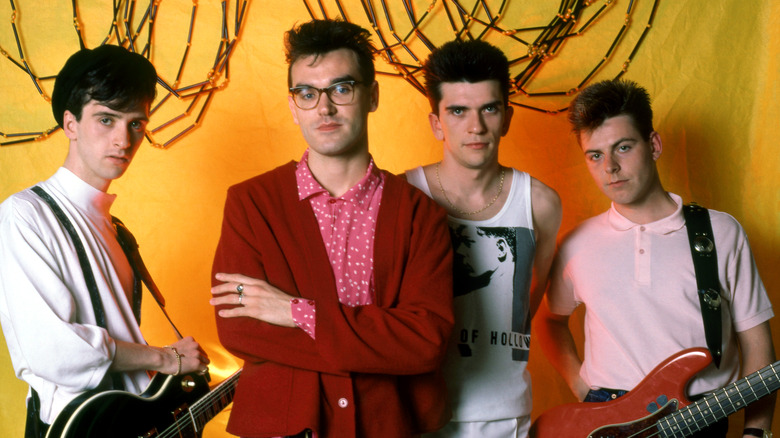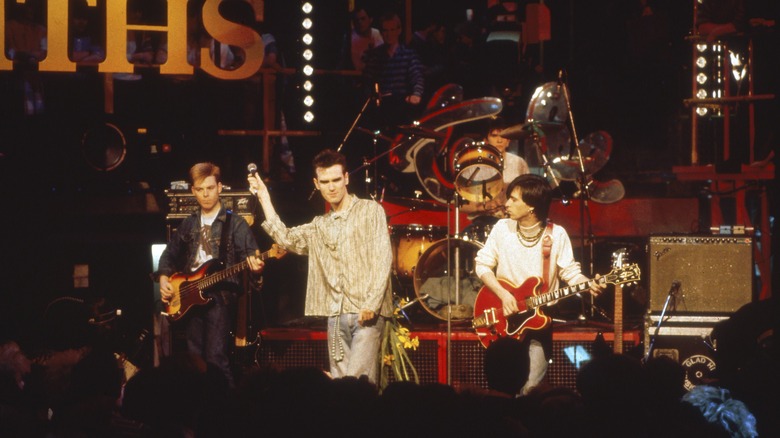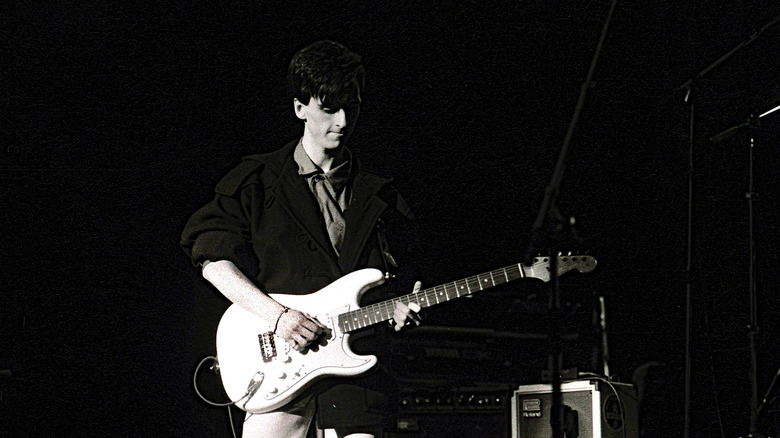Why Morrissey Left The Smiths To Go Solo
Though they existed for only a few years in the mid-1980s when they made a name for themselves as a critically adored and commercially impressive indie act, The Smiths remain one of those bands that music fans will always turn to as a rite of passage, regardless of their generation. Their songs, characterized by a combination of masterful earworm guitar and lyrics of angst-ridden yearning and bleakly humorous view of British life under Margaret Thatcher's Tory government, are simply timeless.
They existed for just five years, during which time the idiosyncratic indie band repeatedly crashed the charts in both the U.K. and the U.S. and became one of the most critically acclaimed acts of the day. But by 1987 the band broke apart, with its members going their separate ways. But though Morrissey was soon successful as a solo act, it wasn't exactly his plan to drop The Smiths and go solo — that was rather a career path forged out of necessity.
An unsettled line-up
According to John D. Luerssen's "The Smiths FAQ," the foundations of the famous Smiths line-up which consisted of Morrissey, guitarist Johnny Marr, bassist Andy Rourke, and drummer Mike Joyce were already shaking at the start of 1986, nine months before their final studio album, "Strangeways Here We Come," hit record stores in November. Specifically, it was around this time that the band said goodbye to Rourke, who had secretly been trying to overcome a heroin addiction. Marr and others connected to the band were aware of Rourke's obsession, but tried to keep it from Morrissey, who had little time for drugs or those who used them.
When Morrissey eventually found out, Rourke was fired from the band, reportedly by a postcard stuffed under the windshield wiper of his car informing him that he had "left the Smiths," though Morrissey has long denied this. Marr, a childhood friend of Rourke's, was reportedly torn over having to expel the bassist from the group but believed it was necessary to save the group while also working as a catalyst for Rourke to get clean.
If you or anyone you know needs help with addiction issues, help is available. Visit the Substance Abuse and Mental Health Services Administration website or contact SAMHSA's National Helpline at 1-800-662-HELP (4357).
Johnny Marr had already left
Alongside Morrissey, guitarist and composer Johnny Marr was part of The Smiths' genius, whose lush arrangements and distinctive guitar sound made the band stand out in the post-punk backdrop of mid-80s indie. He has been critically lauded as one of the most imaginative and talented British guitarists of recent decades.
Marr was key to the musical direction of The Smiths, and was instrumental in evolving their sound throughout the few years they were together as a band. Considering their brief tenure, The Smiths were hugely prolific, releasing four studio albums and dozens of classic non-album singles including "Panic" and "Heaven Knows I'm Miserable Now," as well as various compilations and live sessions. The Smiths also had a brutal touring schedule, and by 1987 Marr was burnt out, while also having to deal with managing the band and recovering from a car accident. Increasingly, Marr was looking to refresh himself by working with other artists and turned away from Morrissey, whose fondness for '60s pop covers he was growing tired of. Eventually, news of the rupture hit the British music press, and headlines stating that the band was breaking up resulted from the rumors. Believing the write-up was a conspiracy orchestrated by Morrissey to force his hand, Marr eventually declared that he was leaving.
Morrissey was forced to make the jump to solo act
Despite the loss of Johnny Marr, Morrissey made the difficult decision to try and soldier on with the band, by replacing his songwriting partner with a new guitarist. Morrissey recruited Ivor Perry, a well-thought-of lead guitarist who had previously played with Easterhouse.
But without Marr, The Smiths were, simply put, no longer The Smiths, and though Morrissey tried to muddle on without his songwriting partner, it simply wasn't viable. "The real beauty of The Smiths had gone," Mike Joyce later told the Smiths biographer Johnny Rogan (via Mojo). The band split completely just weeks after Marr's departure.
As noted by Billboard, Morrissey's reticence when it came to taking the whole limelight himself is shown on his patchy solo debut album, "Viva Hate," released in March 1988. Though it arrived just six months after the final Smiths album "Strangeways Here We Come," it is the sound of an artist struggling to find his feet after losing the collaborator who had helped him turn into a star.



